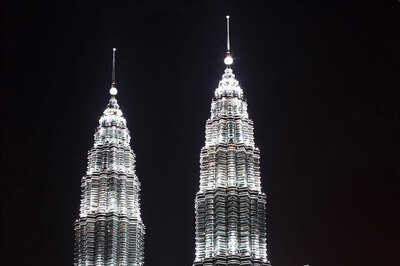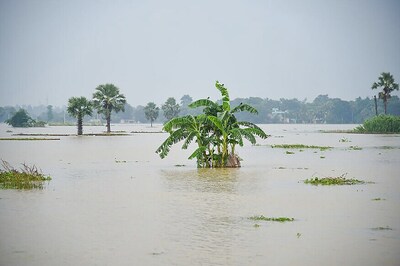
views
The dreadful suicide bombing of the mosque in the heart of the highly protected Police Lines in Peshawar, in which more than 100 people were killed and scores of others injured, must count as one of the worst terror attacks in Pakistan’s long, complicated and quite convoluted history of dealing with Islamist terror groups. Although Pakistan has seen many mass casualty attacks, the Peshawar mosque attack is truly devastating. The terrorists have certainly demonstrated their capability to successfully strike inside such a high-security area. In the process, they have delivered a shattering blow on the morale of the Khyber Pakhtunkhwa police which is facing the brunt of the resurgent Tehrik-e-Taliban Pakistan (TTP) terrorists. There is now an all-pervading sense of insecurity in both the people and the authorities.
For many hours after the bombing, the Pakistani security agencies were fumbling around to find out who was responsible for it. The problem was that no group claimed the attack. There was a faction of the TTP that claimed that this was an attack carried out to avenge the assassination of their leader Omar Khalid Khorasani in an IED blast in Afghanistan last year. Khorasani was the head of the dreaded Jamaat-ul-Ahrar which had later merged into the TTP. It is believed that he was bumped off by Pakistani security agencies in a covert operation. The Peshawar mosque attack was retaliation and the group warned that they would intensify their attacks in the coming days and weeks. The TTP, however, distanced itself from the attack after the Afghan Taliban condemned it. But while the TTP said that it had issued clear guidelines on what it considered legitimate targets — mosques were not on that list — the outfit did not disown the JuA faction that took responsibility.
For their part, the Taliban told the Pakistanis to stop blaming them for the attack. They said Pakistan needs to solve its problems rather than find scapegoats. The Pakistani authorities seemed very keen to absolve the Afghan Taliban of any responsibility. They tried to float a narrative based on claims by fake Islamic State Khorasan (ISK) handles that it was an ISKP act. This was hardly surprising given that the Pakistanis, including their foreign minister Bilawal Zardari and other luminaries, have consistently tried to make a distinction between the Afghan Taliban and Pakistani Taliban, even though everyone knows that they are both parts of the same whole. It is inconceivable that the Afghan Taliban or TTP didn’t have any knowledge of what the JuA was planning. A suicide attack is a fairly complex operation with many moving parts. Given the interlinkages of JuA with TTP and of all Pakistani Taliban with Afghan Taliban, it is not possible that an attack like this could be carried out without the complicity of both TTP and the Afghan Taliban.
The Afghan Taliban have an entire unit of suicide bombers who they have proudly paraded in public. It is a well-known fact that there is a market for suicide bombers in that region. The JuA also has carried out such attacks in the past and these are often joint venture operations of different groups and factions. The only thing that is different in this particular operation is that both TTP and Afghan Taliban have maintained plausible deniability, something that the latter has done in the past also when operational exigencies demanded an attack that was ideologically or politically untenable. But all this is known to the Pakistani security agencies and politicians. And yet, they skirt around the issue and try to soft pedal on the Taliban. It is precisely this dichotomous approach on terrorism that has bred so much confusion in the people and even the security forces on who the enemy really is.
Of course, as is their wont, there were the usual characters, including the Pakistan defence minister and a former High Commissioner to India, who were quick to blame India for the attack. But this snake oil isn’t selling very well. Even the compliant and compromised ‘independent’ media of Pakistan is now calling out this fakery. After all, India has virtually no presence in Afghanistan, which is now occupied by the Taliban who were marketed by the Pakistani military and its appendages as Pakistan’s great friends who would ensure that the nation’s western borders would forever be secure. Very inconvenient questions are now being asked of the Pakistan Army and its duplicitous ‘grand strategy’ which has proved ruinous.
The attack has brought to the fore the deep suspicions and distrust of the Pakistan Army and the Inter-Services Intelligence (ISI) that exists in other arms of the state. There are video clips of police officers shouting slogans “those who are the unknowns (a reference to ISI operatives), are known to us.” Reports of cops threatening to resign from service if proper investigations are not held to uncover the plot behind the suicide attack reveal that even law enforcement agencies are suspecting the complicity of the Pakistan Army in the attack. A well-informed journalist disclosed that the suicide bomber had earlier been apprehended and handed over to the ‘agencies’ (ISI) but was released by someone. When one state agency starts pointing fingers at another state agency, it is a sign of how fraught the situation has become and how the state is starting to fray.
Increasingly, the Pakistan Army is being seen as a problem and not a protector by both the classes that chatter and those that matter. All kinds of conspiracy theories are doing the rounds in the corridors of power and the streets of Pakistan about the sinister role of the Army and ISI in the spike in terrorism. The Army is accused of trying to use terrorism to extort money out of the International Monetary Fund (IMF) by floating the narrative of Pakistan under siege of terrorists. At the very least, the IMF can relax the tough conditions it has imposed on Pakistan. Other theories include the Army trying to delay elections or even using terrorism as an excuse to grab power. Yet another theory is that such an attack will be used to justify other military operations which will be used to refurbish the very soiled image of the Pakistan Army. Even if there isn’t an iota of truth in these conspiracy theories, the fact that they find traction in conversations says a lot about how Pakistanis look at their Army.
The Peshawar attack has now clearly put the Pakistani military and political establishment in a difficult situation. They cannot afford to be seen as not doing anything. But whatever they do (assuming it is not an eyewash action, which will only worsen the suspicion and distrust between the various arms of government), will have repercussions. The options being discussed are to undertake ground operations or drone strikes or even air strikes against TTP targets in Afghanistan. Even if these are covert operations and completely deniable, they will force the hands of the Afghan Taliban who have already warned Pakistan against any such action on Afghan soil. The problem for Pakistan is that they didn’t just rear snakes in their backyard but created and reared a ‘Raktbeej’ like monster and no matter how many guys it slays, more will be born to take their place. Pakistan is entering into a never-ending war, which it has no idea how to win or even survive.
The writer is Senior Fellow, Observer Research Foundation. The views expressed in this article are those of the author and do not represent the stand of this publication.
Read all the Latest Opinions here



















Comments
0 comment